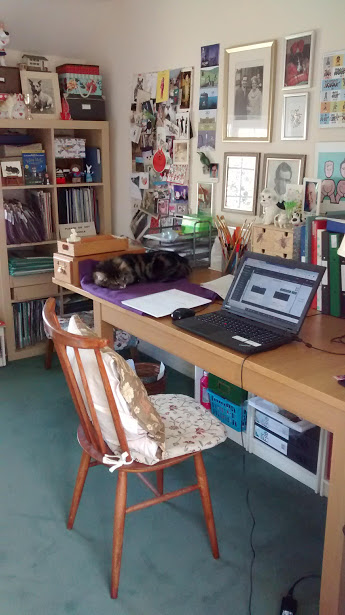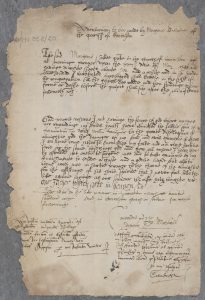
June 29, 2020, by H Cotterill
But what do you do all day? Our third lockdown diary
This is the third in a series of blogs looking at the work that Manuscripts and Special Collections staff have been doing from home, and we are once again focussing on the additions to our manuscripts catalogue.
New Online Catalogue
In the first of this series of blogs, I talked about the planned upgrade to our archival management software, CALM and the Manuscripts Online Catalogue. The upgrade has now taken place and the new version of the online catalogue is available to search here
Read on to discover some of the newly catalogued items that are now available for the first time.
Archdeaconry of Nottingham
The archive of the historic Archdeaconry of Nottingham is one of the most extensive manuscript collections that we hold. The Archdeaconry court, an ecclesiastical court, had jurisdiction over almost the whole county of Nottingham. Up until the mid-17th century ecclesiastical courts such as this had wide powers to investigate local communities and ordinary people were subject to its control and influence in a number of ways. People were brought before the court for a wide variety of offences, including religious dissent, non-payment of church dues and superstitious practices. By the mid-18th century, the court’s attention was mostly focused on the problem of illegitimate births. Offenders brought before the court could be asked to perform a penance, and could be excommunicated for non-compliance.
The majority of the Archdeaconry collection is already catalogued in great detail but we have a longstanding project to catalogue the thousands of penances. When we realised that lockdown was coming we copied hundreds of penances so that cataloguing work could continue at home.
An unexpected silver-lining to being out of the office is that we’ve had more time to devote to tasks like this. One of our archive assistants, Jayne Amat, had this to say about the work that she’s been doing: Since lockdown I’ve managed to catalogue nearly four times the number of penances I would have done had I been at work. Usually, other, more time-critical, work gets in the way but due to lockdown I’m able to focus on tasks like this for longer periods of time, without interruption. The penances I’m working on (AN/PN/360/1-917) date from 1628-1641 so the handwriting can be challenging (and is sometimes in Latin) but the more I do the better I get at palaeography. Adding detailed information (names, places, dates, offences) to the catalogue records allows researchers to find documents through our Manuscripts Online Catalogue and I’m confident that some researchers get what they need without having to visit.
The catalogue of the Archdeaconry collection is available here and more information about the collection is available on our website. Archivist Kathryn Steenson recorded a talk about the Archdeaconry collection as part of the Local History & Archaeology Festival which can be viewed on YouTube.
Hoyland
An important and fascinating addition to the online catalogue is MS 733, the Papers of John S. Hoyland, Quaker and Missionary (1887-1957). The collection comprises 24 boxes. The detailed cataloguing work was undertaken prior to lockdown, but work has recently finished on editing the entries, meaning that they can now be made available.
John Somervell Hoyland was born in Edgbaston, Birmingham on 12 December 1887. The Hoylands were an old Quaker family and John’s father, John William Hoyland, was the first principal of the Kingsmead College in Selly Oak, Birmingham, a college for training missionaries. After school and Cambridge University John Somervell attended Hartford Seminary School of Missions, USA (1907-1910).
From 1912 to 1928, Hoyland worked as a missionary in India, and it is to this period of his life that his papers chiefly relate. He began as principal of the Friends’ Mission High School at Hoshangabad and in 1919 moved to Nagpur to become a lecturer in history and English at Hislop College where he remained until 1928.
The collection offers a detailed insight into the work of an English missionary in India during the period of the British Raj. There are hundreds of letters sent by Hoyland to family and friends in England as well as letters sent to him. A significant series of letters describe his work during an influenza epidemic in 1918, for which he was awarded the Kaiser-i-Hind Gold Medal. Many of the letters also deal with personal issues, such as the death of his first wife Helen Doncaster, who died whilst the couple were in India.
The catalogue of the Hoyland collection can be viewed here. You can search the manuscripts catalogue at http://mss-cat.nottingham.ac.uk/
Coming next
Keep reading our blog for further updates on the work of Manuscripts and Special Collections. The next post in this series will focus on our online exhibitions.
No comments yet, fill out a comment to be the first


Leave a Reply